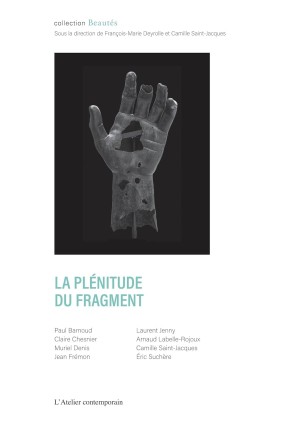THE COMPLETENESS OF THE FRAGMENT- ED. L'ATELIER CONTEMPORAIN
Contributions by Paul Barnoud, Claire Chesnier, Muriel Denis, Laurent Jenny, Arnaud Labelle-Rojoux, Camille Saint-Jacques, Éric Suchère.
Collection Beautés - 129 pages
under the direction of François-Marie Deyrolle and Camille Saint-Jacques
The fragment differs from the formless, the discarded, and the raw material in that it is considered to be the dramatically separated vector of a larger entity. In its presence, we feel a kind of nostalgia for the missing whole that is lacking. Roland Barthes' Fragments of a Lover's Discourse, for example, is imbued with this sense of tragedy: how can we claim to express the totality of romantic love once and for all? Similarly, every step we take in the ruins of Pompeii or Herculaneum is marked by the tragedy of October 79. The stones, frescoes, and everyday objects move us aesthetically because they bear within them both the mark of surprising beauty and that of a tragedy that sums up the fragility of our existence. The relevance of the fragment lies in the power of the lack it reveals in us. Suddenly, the simple pebble picked up on the beach, becoming the memory of a memorable moment, imposes itself on us who have kept it as the summary of a turning point in our existence. This new volume in the “Beauties” collection brings together, in its usual multidisciplinary approach, eight texts that question, approach, and recapture the notion of the fragment in art—a fragmentation that is often only a reflection of that of life itself.
